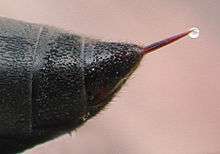sting
See also: STing
English

A wasp sting--a pointed portion of an insect
Pronunciation
- IPA(key): /ˈstɪŋ/
Audio (US) (file) - Rhymes: -ɪŋ
Etymology 1
From Middle English stynge, sting, stenge, from Old English sting, stinċġ (“a sting, stab, thrust made with a pointed instrument; the wound made by a stab or sting”), from Proto-Germanic *stangiz.
Noun
sting (plural stings)
- A bump left on the skin after having been stung.
- A bite by an insect.
- A pointed portion of an insect or arachnid used for attack.
- A sharp, localised pain primarily on the epidermis
- (botany) A sharp-pointed hollow hair seated on a gland which secretes an acrid fluid, as in nettles.
- The thrust of a sting into the flesh; the act of stinging; a wound inflicted by stinging.
- Shakespeare
- the lurking serpent's mortal sting
- Shakespeare
- (law enforcement) A police operation in which the police pretend to be criminals in order to catch a criminal.
- A short percussive phrase played by a drummer to accent the punchline in a comedy show.
- A brief sequence of music used in films, TV, and video games as a form of punctuation in a dramatic or comedic scene.
- A support for a wind tunnel model which extends parallel to the air flow.
- 2001, T. J. Mueller, Fixed and Flapping Wing Aerodynamics for Micro Air Vehicle Applications:
- The balance is mounted externally on top of the wind tunnel test section. A sting connects the balance to the model.
-
- (figuratively) The harmful or painful part of something.
- Bible, 1 Corinthians xv. 56
- The sting of death is sin.
- 2011 January 19, Jonathan Stevenson, “Leeds 1 - 3 Arsenal”, in BBC:
- Just as it appeared Arsenal had taken the sting out of the tie, Johnson produced a moment of outrageous quality, thundering a bullet of a left foot shot out of the blue and into the top left-hand corner of Wojciech Szczesny's net with the Pole grasping at thin air.
- Bible, 1 Corinthians xv. 56
- A goad; incitement.
- (Can we find and add a quotation of Shakespeare to this entry?)
- The point of an epigram or other sarcastic saying.
Synonyms
- (pointed portion of an insect): stinger
Translations
bump on skin after having been stung
bite or sting (by an insect)
|
|
pointed portion of an insect or arachnid used for attack — see stinger
sharp, localised pain in epidermis
police operation
|
- The translations below need to be checked and inserted above into the appropriate translation tables, removing any numbers. Numbers do not necessarily match those in definitions. See instructions at Wiktionary:Entry layout#Translations.
Etymology 2
From Middle English stingen, from Old English stingan, from Proto-Germanic *stinganą. Compare Swedish and Icelandic stinga.
Verb
sting (third-person singular simple present stings, present participle stinging, simple past stung or (rare, dialectal) stang, past participle stung)
- (transitive) To hurt, usually by introducing poison or a sharp point, or both.
- Right so came out an adder of a little heathbush, and it stung a knight in the foot.
- Still, it stung when a slightly older acquaintance asked me why I couldn't do any better.
- (transitive, of an insect) To bite.
- (intransitive, sometimes figurative) To hurt, to be in pain.
- My hand stings after knocking on the door so long.
- (figuratively) To cause harm or pain to.
- I thought I could park in front of the hotel, but they stung me for five pounds!
Derived terms
Translations
to hurt
|
of an insect: to bite
|
|
- The translations below need to be checked and inserted above into the appropriate translation tables, removing any numbers. Numbers do not necessarily match those in definitions. See instructions at Wiktionary:Entry layout#Translations.
Middle English
Norwegian Bokmål
Etymology
From the verb stinge
Norwegian Nynorsk
Etymology
From the verb stinge
Old English
Etymology
From Proto-Germanic *stangiz; akin to stingan.
Pronunciation
- IPA(key): /stinɡ/, [stiŋɡ]
Romanian
This article is issued from
Wiktionary.
The text is licensed under Creative
Commons - Attribution - Sharealike.
Additional terms may apply for the media files.